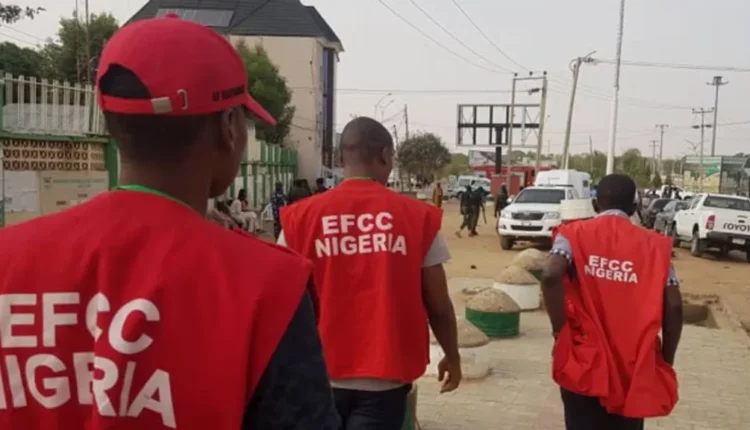Amidst Naira Fall: EFCC raids Bureau de Change operators in Kano, other states
The Economic and Financial Crimes Commission (EFCC) has launched a nationwide manhunt against persons involved in currency racketeering.
According to sources at the EFCC, the move is to safeguard Nigeria’s foreign exchange market and combat speculative activities.
A source who asked not to be named said that EFCC’s concerted effort is to identify and bring to justice individuals engaged in currency-related illegal activities, including those involving foreign exchange speculation and other fraudulent practices.
Read Also:Senate confirms 17 for population commission appointment
“The commission is determined to ensure that the foreign exchange market operates in a fair and transparent manner and that Nigeria’s economy is protected from criminal activities that could lead to its destabilization,” said the source.

In Kano on Wednesday, EFCC operatives were said to have raided BDC operators at Wapa, Fagge local government area of the state with almost ten vehicles fully armed.
Some of the BDC operators that spoke to SOLACEBASE expressed surprise and sadness over the incessant invasion of their business premises by the anti-graft agency whenever there is a surge in the price of foreign exchange especially dollars which is not their making.
”Yes they arrested some of our colleague BDC operators accusing us of the fall in the value of naira.
”BDC operators at Wapa under the leadership of Alhaji Sani Salisu Dada have always been cooperating with the authorities so as to ensure that we do not operate outside the guidelines of our activities, ”said a BDC operator who does not want his name out as he was not authorized to speak with the media.
Read Also:Senate probes Buhari, Emefiele over N30trn Ways and Means
Numerous viral videos on social media have depicted the EFCC arresting individuals, particularly those connected to bureaux de change. Successive governments have attributed the continuous decline of the naira against the dollar to these individuals.
A video posted by Oyoaffairs on X shows many police officers moving on the streets across Sabo in Ibadan, the Oyo capital.
An X user @Von_Bismark posted online, “Breaking: EFCC just invaded and arrested all BDC operators in Enugu. Is this how to rescue the Naira?
Similarly, Arewa_source said the EFCC “attack on BDC operators in Zone 4 Abuja is a direct attack on northerners. It is no longer news that over 95% of BDC guys in Zone 4 are northerners.”
The poster added, “The CBN Governor should be very careful.
Read Also:ANALYSIS: Will Nigeria ever recapture all escaped prison inmates?
Emefiele tried that, he should (have) asked him how it turned out to be!”
But Dele Oyewale, spokesperson for the EFCC, said the anti-graft agency was going after “unlicensed money changers.”
“Unlicensed operators are behind the exchange rates crisis in this country. Those who are licensed would be guided by the rules and regulations of federal authorities,” Mr Oyewale said.
He added, “So what we’re doing is to go after the unlicensed money changers. It is to separate those who are legitimate BDC operators from the criminal speculators. We need to know where we stand in how we manage our exchange rates.”
The EFCC had formed a 7,000-man special task force across its 14 zonal commands to clamp down on dollar racketeers.
On Tuesday, Nuhu Ribadu, the National Security Adviser, directed several law enforcement agencies to crack down on “dollar racketeers“.
The NSA directive came amid an increased rate of the continued decline of the naira against the U.S. dollar across the official and unofficial markets.
According to data published on the FMDQ website, the naira closed at N1,598.54/$1 in the official market on Monday, compared to N1,537.96 in the previous market on Friday. This represents a 3.94 percent depreciation from the previous market rate.
It could be recalled that on Monday EFCC went after some bureau de change operators alleged to have been responsible for the rapid increase in the dollar rate to naira.



Comments are closed.